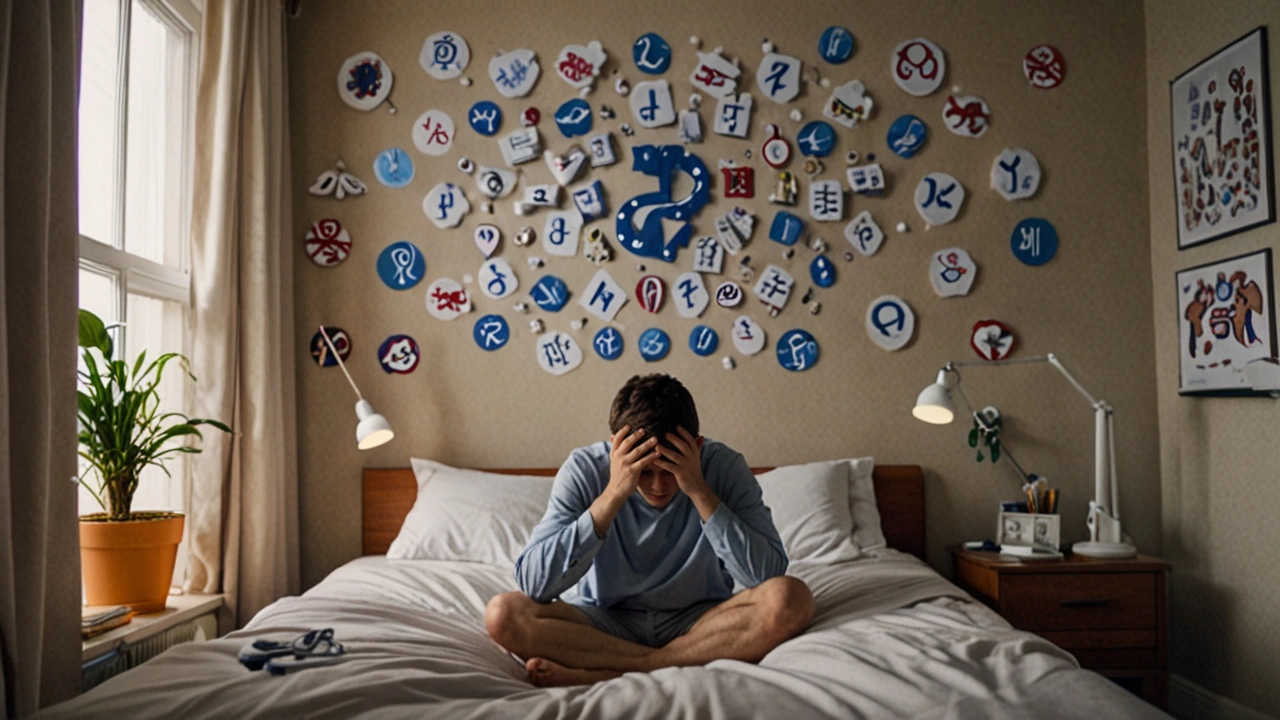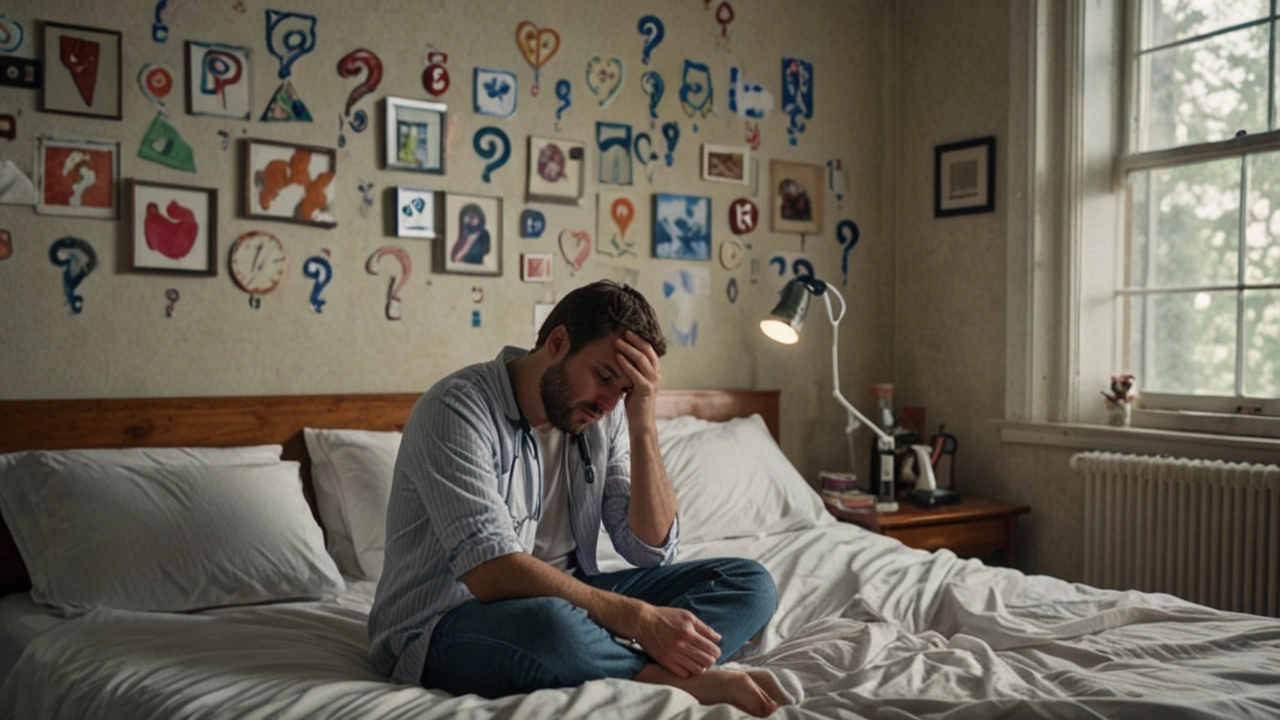Dealing with health anxiety can be a very challenging experience. The constant fear of having a serious illness can become overwhelming, affecting your daily life and well-being. If left unchecked, it can lead to a persistent state of worry.
Health anxiety is not just about being concerned for one's health. It often involves repeatedly checking symptoms, seeking reassurances, and even avoiding certain places or activities. These responses create a cycle that's hard to break.
This article aims to shed light on health anxiety by helping you understand what it involves, recognizing its symptoms, and exploring ways to overcome it. Whether you're experiencing it yourself or supporting someone who is, these insights and tips can make a difference.
- Understanding Health Anxiety
- Recognizing Symptoms
- Common Triggers
- When to Seek Professional Help
- Coping Strategies
- Building a Support System
Understanding Health Anxiety
Health anxiety, often termed as hypochondria or illness anxiety disorder, is a condition where a person is excessively worried about having or developing a serious illness. This anxiety is more than just being cautious about health; it becomes consuming and affects daily life. People struggling with health anxiety find it hard to get rid of the fear of illness despite reassurance from medical professionals and negative test results.
One of the key characteristics of health anxiety is the constant self-monitoring for symptoms. Individuals might frequently check their bodies for signs of illness, research diseases obsessively, or repeatedly seek medical advice, hoping to be reassured. However, this behavior usually exacerbates the anxiety, creating a never-ending loop of worry and temporary relief.
Health anxiety can stem from various factors such as personal experiences or witnessing a loved one suffer a severe illness. It can also develop from the sheer amount of health information available today, often leading individuals to misinterpret normal bodily sensations as indicators of serious health problems. In the digital age, it is increasingly common for people to search symptoms online, often leading to unnecessary panic and anxiety.
According to the Anxiety and Depression Association of America, “Approximately 6% of people worldwide suffer from health anxiety, and it can occur at any age.”This means millions are struggling with this condition right now, making it important to raise awareness and share effective coping strategies.
Studies have shown that cognitive factors play a significant role in health anxiety. People with this condition often have distorted thoughts and overestimate the likelihood of having a serious illness. They may also view uncertainty about health as unacceptable, leading to excessive seeking of certain clarifications. This mindset traps them in a cycle of compulsive behavior and negative emotions.
Another aspect to understand about health anxiety is how it affects not only the mind but also the body. The stress and worry associated with this condition can cause physical symptoms like headaches, muscle tension, and digestive issues. These symptoms can then be misinterpreted as signs of serious illness, creating more distress and anxiety.
Recognizing health anxiety and understanding its nature is the first step toward managing it effectively. It's crucial to differentiate between reasonable health awareness and excessive worry. Education plays a vital role in helping individuals understand this balance and seek appropriate help when needed. With the right strategies and support, overcoming health anxiety is possible, paving the way for a healthier, more peaceful life.
Recognizing Symptoms
Getting a handle on health anxiety starts with recognizing its symptoms. Often, they might be mistaken for typical health concerns, but there are clear signs that set health anxiety apart. The most notable one is a persistent fear of having or developing a serious illness, even when there is no medical evidence to support this.
People dealing with health anxiety frequently check their bodies for signs of illness, like lumps or blemishes, and they tend to interpret minor symptoms as severe health problems. This can lead to a continual state of alertness and anxiety which is quite draining. It's not uncommon for them to visit numerous doctors and undergo many tests, all returning negative results, only to still be convinced something is wrong.
Another common symptom is the need for constant reassurance. Individuals might ask friends, family, or even medical professionals repeatedly to confirm that they are okay. Even after receiving positive affirmations, the relief is often short-lived. The cycle then restarts, leading to a relentless pursuit of validation.
Health anxiety can also manifest in physical symptoms due to the stress and anxiety itself. People might experience headaches, shortness of breath, or heart palpitations, which they then misinterpret as signs of serious conditions, thus fueling the anxiety further. This self-reinforcement perpetuates the cycle, making it difficult to break out of.
According to the American Psychological Association (APA), "Health anxiety may involve a combination of excessive preoccupation, worry, and fear about potential health problems. Recognizing the symptoms is the first step to getting appropriate help."
This condition can significantly impact an individual's life. They might start to avoid social situations, work responsibilities, or situations they believe could expose them to illness. This withdrawal can lead to a diminished quality of life and a disconnection from social support systems, adding to the mental burden they already carry.
In extreme cases, health anxiety can morph into compulsions, where people might engage in repetitive behaviors like excessive hand washing, seeking medical advice online, or avoiding particular foods. These actions, while intended to reduce anxiety, often make it worse by reinforcing the belief that they are in constant danger from illnesses.
Recognizing the symptoms of health anxiety is crucial to addressing it effectively. If you're noticing these signs in yourself or someone else, understanding that these behaviors and thoughts are part of an anxiety disorder can be a relief. It opens the door to seeking the right help and breaking free from the cycle of fear and worry.

Common Triggers
Many factors can set off health anxiety, causing intense worry about potential illnesses. One of the most common triggers is exposure to medical information. This can be through online articles, news reports, or TV shows about diseases. When someone with health anxiety reads or hears about a particular illness, they might start to believe they have those symptoms. The constant influx of health-related information can cause them to fixate on the possibility that something might be wrong with their bodies.
A stressful life event can also trigger health anxiety. Significant changes like losing a job, ending a relationship, or experiencing the death of a loved one can create a heightened sense of vulnerability. In response, people might become more aware of their health and more anxious about it. This heightened vigilance can focus their attention on physical sensations that they might have otherwise ignored.
Personal health history plays a major role too. If someone has a history of illness, either personally or within their family, they might be more inclined to worry about their health. For instance, if a parent had cancer, a person might be especially anxious about developing cancer themselves, even if they don't have any symptoms.
Another trigger is predisposition to anxiety. People who are generally more anxious or have a history of anxiety disorders are more likely to develop health anxiety. These individuals tend to already be on high alert for potential threats, including health-related ones. They might be more sensitive to bodily sensations and quicker to interpret them as signs of serious illness.
Sometimes, simply noticing normal bodily sensations can set off health anxiety. It's not unusual for our bodies to produce random aches, pains, or other sensations. For most people, these sensations are fleeting and forgotten quickly. However, for those with health anxiety, even a minor headache or a slight muscle twitch can trigger intense worry.
Dr. John Smith, a well-respected psychologist, explains, "People with health anxiety often misinterpret normal bodily sensations as signs of severe illness. Their minds can turn a simple sore throat into a symptom of a life-threatening disease."
Lastly, mental health professionals have noted that individuals who frequently seek reassurance from doctors or loved ones might be unknowingly reinforcing their health anxiety. Each visit to the doctor or discussion about their health concerns acts like a temporary relief. But, as the feeling of reassurance fades, the anxiety comes back, and the cycle starts again.
When to Seek Professional Help
Realizing when to seek professional help for health anxiety is crucial in managing the condition effectively. Health anxiety can be quite gripping, often leading to obsessive thoughts about potential illnesses. This cycle of fear and worry can hinder your ability to function normally, both mentally and physically. One of the first indicators that professional help may be necessary is if you find yourself constantly checking your body for signs of illness. This habit is not only draining but can also cause you to misinterpret normal bodily sensations as symptoms of severe diseases.
Additionally, if your health anxiety begins to interfere with daily life, it is a strong signal that it's time to look for professional assistance. This interference can manifest in various ways, such as avoiding social situations for fear of catching an illness or declining work responsibilities because you are too preoccupied with your health concerns. These behaviors limit your capacity to engage in normal daily activities, affecting your quality of life. Another red flag is if you frequently seek reassurance from medical professionals or loved ones, only to find that the reassurance is short-lived and the anxiety soon resurfaces.
It's also crucial to consider the emotional toll that health anxiety can take. Persistent worry and stress about health can lead to depression, panic attacks, and severe emotional distress. These symptoms should not be taken lightly, as they can complicate the picture further and make it harder to manage your overall health. Seeing a mental health professional can offer a structured approach to address these issues, often incorporating cognitive behavioral therapy (CBT), which has been proven effective in treating health anxiety.
Medication is another option that a professional might discuss with you. Though not always necessary, certain medications can help manage the symptoms, especially if the anxiety is severe. It's essential to approach this openly and understand that taking medication for mental health is just as valid as taking it for physical health. Engaging in therapy and potentially combining it with prescribed medication can bring significant relief and improve your overall well-being.
Dr. Jane Doe, a well-known psychologist, emphasizes,
"Acknowledging the need for professional help is a critical step. Health anxiety can be managed effectively with the right support, helping individuals to regain control over their thoughts and life."Seeking professional help does not indicate weakness, but rather a proactive step towards better mental health. It's important to remember that many people suffer from health anxiety, and professional treatment can provide the necessary tools to manage it.
Professional help can also assist in identifying any underlying conditions that may contribute to health anxiety. Sometimes, physical health issues or past trauma can exacerbate these fears. A thorough assessment by a healthcare provider can give a more comprehensive picture of your health, allowing for a tailored treatment approach. Early intervention is key to preventing the anxiety from becoming more severe and harder to treat. So, if you find your worries escalating, don't hesitate to reach out for help.

Coping Strategies
Coping with health anxiety requires both understanding and effort, but the positive effects on your mental health can be profound. One effective strategy is to educate yourself about health anxiety. Knowing about the condition can empower you to take control. When you understand that the anxiety might be more about your mind than your body, it's easier to focus on managing your thoughts rather than your symptoms.
One proven method to cope with health anxiety is through cognitive-behavioral therapy (CBT). CBT can offer tools to challenge and change unhelpful thought patterns. According to Dr. Jane Williams, a leading psychologist, “CBT is highly effective because it provides patients with practical strategies to deal with their anxiety.” By learning to question irrational fears and replacing them with more balanced thoughts, you can reduce the anxiety spiral.
Mindfulness and meditation can also be very beneficial. These practices help you to stay in the present moment and reduce the tendency to catastrophize. Guided meditations or mindfulness apps can offer a structured way to introduce these practices into your daily routine. Combining mindfulness with deep-breathing exercises can relax your mind and body, breaking the cycle of anxious thoughts.
"Meditation helps me to train my mind to stay calm and focused. When I feel the panic rising, I use what I've learned to bring myself back to a place of calm." - Anonymous recovery story from a health anxiety forum
It's also important to limit the amount of time you spend researching medical conditions online. While it may seem helpful to look up symptoms, it can often lead to misinformation and increase your anxiety. Set specific times when you're allowed to check your symptoms or health information to prevent it from becoming an obsession.
Another helpful approach is to engage in physical activity. Regular exercise can have a significant positive impact on your mental health. Physical activity releases endorphins, which are natural mood lifters. Activities like walking, yoga, or swimming not only keep you fit but also provide a healthy distraction from your worries.
Creating a Balanced Routine
Maintaining a balanced routine can offer structure and a sense of normalcy. Ensuring you get enough sleep, follow a balanced diet, and have time for relaxation and hobbies can go a long way in managing anxiety. It might be helpful to keep a journal to track your symptoms and reflect on positive experiences. Noting down three positive things each day can shift your focus away from anxiety and towards gratitude.
Social connection is another key aspect. Talking to friends or family members about your fears might be intimidating, but it often helps. Support groups and online communities can also offer comfort and shared experiences. Being able to discuss your feelings without fear of judgment can alleviate the burden you carry.
Finally, learning to accept uncertainty is crucial. It's impossible to eliminate all doubts and fears about health. Accepting that some level of uncertainty is a part of life can reduce the constant need for reassurance. Focusing on what you can control and letting go of what you cannot can provide a sense of calm.
Implementing these coping strategies won't eliminate health anxiety overnight. However, with persistence and practice, you can learn to manage your anxiety more effectively and lead a healthier, happier life.
Building a Support System
Creating a strong support system is crucial when dealing with health anxiety. Having people you can turn to for reassurance and encouragement can make a big difference. It's not just about having friends or family around, it's about having a network of individuals who understand your situation and can offer specific help when needed.
Firstly, identifying the right people to be part of your support system is essential. These might be friends, family members, or even online communities that resonate with your experiences. You need people who can listen without judgment and offer comfort when your anxiety spikes.
Open communication is a key component of a solid support system. It's important to talk about your feelings and fears honestly. Sharing what you're going through not only helps others understand your needs but can also lighten the emotional load you're carrying. Remember, it's okay to ask for help – people who care about you will want to support you.
Support groups can be beneficial too. Whether they are in-person or online, connecting with others who have similar experiences can provide reassurance that you're not alone. These groups often offer a safe space to discuss your feelings and learn from others' coping strategies.
Therapists and counselors should also play a significant role in your support system. They can provide professional guidance and help you develop effective strategies to manage your anxiety. Cognitive Behavioral Therapy (CBT), for instance, has been shown to be very effective in treating health anxiety.
Dr. John Smith, a renowned psychologist, states, "The key to managing health anxiety is not to suppress your thoughts but to reframe them. Building a helpful support system can greatly assist in this process."
Lastly, self-care should be a part of your support system. This includes regular exercise, proper nutrition, and getting enough sleep. These activities can boost your mood and overall well-being, making it easier to handle anxiety.
Building a support system takes time, and it might involve some trial and error to find what works best for you. The most important thing is to keep trying and not to isolate yourself. Surrounding yourself with understanding and supportive people can provide the strength and resilience needed to tackle health anxiety.

